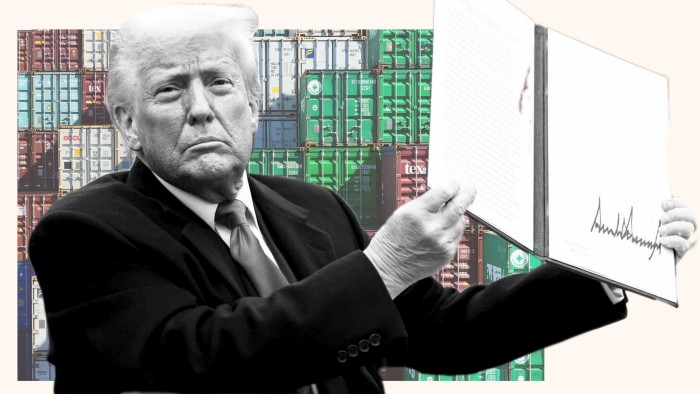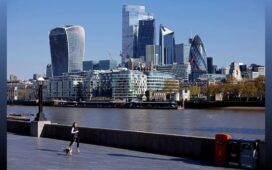Unlock the White House Watch newsletter for free
Your guide to what Trump’s second term means for Washington, business and the world
European and UK companies are laying bare the cost of the US trade war, with executives outlining the hit to consumer confidence, the threats to supply chains and the destabilising effect of prolonged uncertainty over the level of tariffs.
Nestlé, the world’s largest food company, Mercedes-Benz and UK consumer goods group Unilever are among a wave of companies to have put investors on notice of how business conditions have shifted since Donald Trump announced a blitz of tariffs against America’s trading partners last month.
In the first set of quarterly results since the US president’s “liberation day” event, companies spelt out the multipronged challenges, including a slowdown in the US, a major market, and fading hopes for a robust economic rebound in the euro area.
Jesper Brodin, head of Ingka, which operates the vast majority of Ikea stores, said that one of the biggest dilemmas was how to respond to the speed at which the White House was announcing policies with potentially far-reaching implications for supply chains and pricing strategies.
“I remember the days when politicians were slow and the companies were fast, and there’s no way Ikea can adapt its footprint, strategy on this type of time horizon,” Brodin told the Financial Times, adding that the group typically takes at least a 10-year view when deciding a plant’s location.
The administration’s trade policy, which Trump has said will bring investment, plants and jobs to America, has dominated quarterly earnings calls from European and UK companies.
In April, tariffs were mentioned 223 times on calls by companies on the benchmark Stoxx Europe 600 index, which includes many listed in London, according to FactSet data, compared with 115 in March.
The sharp rise reflects the impact of the April 2 “liberation day” event when Trump imposed a baseline tariff of 10 per cent on trading partners and steeper so-called reciprocal tariffs on dozens of countries. The White House subsequently delayed the imposition of the higher duties for 90 days to allow for talks on trade deals.
With the baseline tariffs only coming into force on April 5, the number of companies quantifying the cost of the duties has been limited.
But many executives argued that the protracted uncertainty over the final rate of so-called reciprocal tariffs and the ultimate shape of trade deals was itself damaging, hobbling their ability to plan and make financial forecasts.
“I think uncertainties created by economic policies, trade wars and evolution also of the financial markets have increased the concerns and created more uncertainty,” said Nestlé chief executive Laurent Freixe.
Talks between the EU and the US have made little progress, with Brussels set to impose retaliatory tariffs on July 8 in the absence of a trade deal. The UK and the US remain in talks over a deal.
Faced with the lack of clarity, Stellantis, owner of the Fiat and Chrysler brands, Mercedes-Benz and Volvo Cars are among the companies to have scrapped their forecasts.
“You are starting to see companies making statements about low visibility and unwillingness to make long-term plans,” said Fabiana Fedeli, a portfolio manager at M&G Investments.
Investors have yet to hear from many of the 517 companies on the Stoxx 600 that report quarterly results, but have already been told of the chilling effect that tariffs have had on consumer confidence and dealmaking.
Reckitt, the UK maker of Strepsils and Dettol, said that the market volatility that followed “liberation day” could affect the multibillion-dollar sale of its cleaning products business.
Nestlé’s Freixe told analysts that the year began with consumers who were “not optimistic, to say the least”, and that tariffs had made the picture worse.
Unilever, one of the biggest companies on the FTSE 100, highlighted the potential impact of significant swings in currencies since the tariffs, with acting chief financial officer Srinivas Phatak describing the dollar’s steep fall against the euro in a matter of weeks as “unprecedented”.
Global stocks have rallied over the past week over indications that the US and China may begin to seek an end to their stand-off over trade, which has led to Washington and Beijing imposing punitive tariffs.
Executives used earnings calls to warn that real clarity over trade policy was needed for companies to resume making significant decisions.
UK clothing retailer Primark, which is planning to double its number of US stores to 60 by next year, could potentially move some manufacturing from China, according to George Weston, chief executive of Associated British Foods, Primark’s parent company.
But he added: “We will only adapt supply chains when we have a bit more certainty about the long-term position of different supply markets vis-à-vis the US market.”
Additional reporting by Kana Inagaki and Emily Herbert in London





